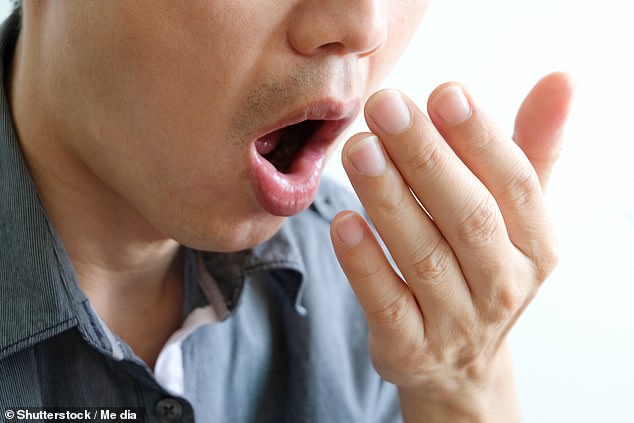From the ridges on your fingernails to the colour of your tongue, there are plenty of signs that something might be wrong with your health.
Now, an expert has revealed the smell of your breath is something to keep an eye on, too.
Many might assume that bad breath – also known as halitosis – is the result of poor teeth cleaning or drinking too much coffee.
However, research suggests breath odour may be an early warning sign of systemic health issues.
Certain scents could indicate diabetes, while others could point to liver dysfunction.
‘Your breath can offer a surprising window into your health,’ dental technologist Allen Zhang said.
He said there are five commonly overlooked types of breath that could signal a health issue.
So, do you recognise any of them?

Research suggests breath odour may be an early warning sign of systemic health issues, and not just the result of too many cups of coffee (file image)
FRUITY OR ACETONE-LIKE
This odour could indicate poorly-controlled diabetes, Mr Zhang explained.
Research suggests that fruity-smelling breath can be a sign of high ketone levels in the blood, which can occur in individuals with the condition.
Those affected might have breath that smells like pear drop sweets or nail polish remover.
METALLIC
This smell could suggest someone is suffering from kidney dysfunction or heavy metal exposure.
This symptom arises when the kidneys are unable to effectively remove waste from the body – including urea, which forms ammonia when mixed with saliva.
The presence of ammonia in breath can sometimes be perceived as having a metallic tinge.

Mr Zhang, a dental technologist, said certain odours are ‘diagnostic clues’ and ‘not just hygiene red flags’ (file image)
FISHY
A fishy-smelling breath could indicate a condition called trimethylaminuria, Mr Zhang said.
This is a metabolic disorder where the body cannot break down trimethylamine, a compound that smells like rotten fish.
Fishy breath can also be a symptom of liver problems, specifically related to a condition called fetor hepaticus.
Fetor hepaticus, often described as ‘breath of the dead’, arises when the liver is unable to properly filter certain toxins from the blood.
These toxins, like dimethyl sulphide, can build up in the blood and be exhaled, causing the characteristic odour.
ROTTEN EGGS
Breath that smells sulphurous or like rotten eggs, can be an indicator of gastrointestinal issues. The smell is called by hydrogen sulphide gas, which can be produced during digestion.
MUSTY
Finally, musty breath could mean there is something wrong with your kidneys or be a sign of liver failure.
‘These are diagnostic clues and not just hygiene red flags,’ Mr Zhang said.
‘New tech is emerging to help clinicians detect disease risk via oral biosignatures, including volatile sulphur compounds and ketones in the breath.’
Mr Zhang is the founder of ProDENT, a company developing intraoral imaging solutions for early detection.

